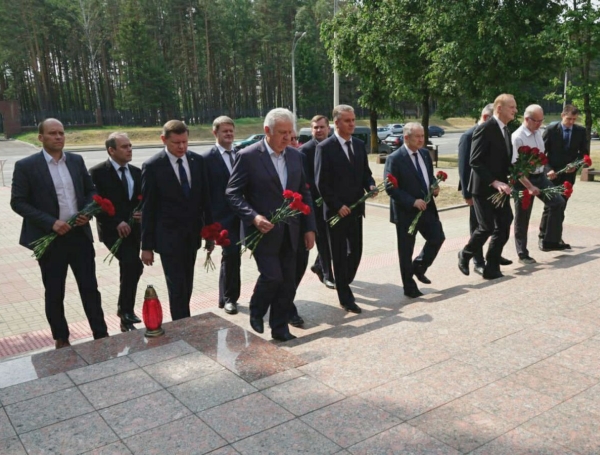
On the National Remembrance Day of the Victims of the Great Patriotic War and the Genocide of the Belarusian People, the leadership of the NAS of Belarus, headed by Academician Vladimir Gusakov, Chairman of the Presidium of the NAS of Belarus, laid flowers at the Obelisk to the fallen prisoners of war and civilians on the 9th kilometer of the Moscow highway in Uruchcha.
The ceremony was attended by Deputy Chairmen of the Presidium of the NAS of Belarus, academic secretaries of the Departments of Sciences of the NAS of Belarus, representatives of public organizations.
"This Obelisk is a tragic and iconic place. 30 thousand people are buried here... Belarusians are one of the most affected nations as a result of the war. During the years of the Great Patriotic War, 209 cities and district centers, more than 9 thousand villages were destroyed and burned, many of them with residents. Almost 3 million died," Vladimir Gusakov said.
Speaking about the genocide of the Belarusian people, the head of the Academy of Sciences cited the latest data on the atrocities of fascists on our country’s territory. "The Nazis chose the policy of genocide and mass terror as the main means of imposing their "new order". Concentration camps, prisons, ghettos operated in almost every district of Belarus. In total, 260 death camps and 70 ghettos were created within the republic. The Trascianiec death camp, located near Minsk, is considered the largest in terms of the number of victims (206.5 thousand people) after Auschwitz, Majdanek and Treblinka. Mass killings of the Jewish population of Belarus and Jews exported from other European countries were committed. More than 530 places of execution and destruction of people on the territory of Belarus have been established. Our whole country is littered with monuments, obelisks, mass graves… That's what the war has brought to our people. This should not be forgotten," Vladimir Gusakov stressed.
The obelisk on the 9th km of the Moscow highway in Uruchcha was erected in memory of 30 thousand Soviet prisoners of war, partisans and civilians who were shot and tortured by the Nazi invaders in 1941–1943.